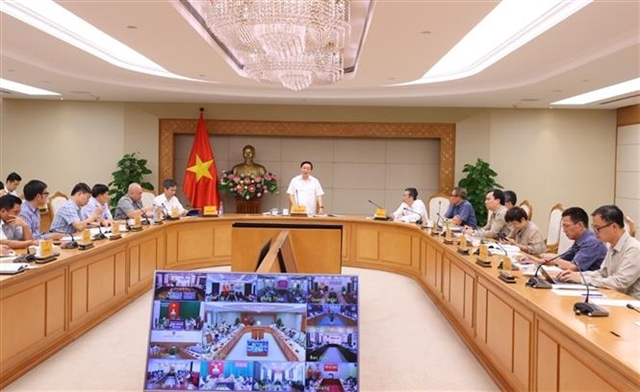 Society
Society


|
| Deputy Prime Minister Trần Hồng Hà delivers a speech at the hybrid meeting to finalise the draft decree on rice cultivation land on Monday. VNA/VNS Photo Văn Điệp |
HÀ NỘI — Deputy Prime Minister Trần Hồng Hà emphasised that the Land Law and the decree on paddy land must include mechanisms and policies that allow key rice-growing localities to fulfill their political duties, while also developing their socio-economic status.
"Farmers should receive focused support, enabling the application of science and technology to improve productivity, aim for large-scale production and ensure stable incomes and livelihoods," he said during a national hybrid meeting to finalise the draft decree on rice cultivation land on Monday.
Addressing specific issues, the Deputy PM requested the drafting agency to amend and supplement criteria for localities to identify high-yield and high-quality rice-growing areas within the allocated specialised paddy land.
Additionally, the Ministry of Agriculture and Rural Development should collaborate with the Ministry of Natural Resources and Environment to identify large rice-growing regions, such as the Mekong Delta, the Red River Delta and the Central Coast, to establish criteria for determining the scale and area of high-yield and high-quality rice land in each region. Based on that they should propose appropriate management policies that reflect practical realities.
Taking into account the opinions expressed during the meeting, Deputy PM Hà tasked the Ministry of Agriculture and Rural Development with compiling a framework of support policies for paddy land in general, as well as for specialised and high-yield, high-quality rice regions.
He stressed that the decree should include new regulations and mechanisms to help organisations, businesses and farmers cope with climate change risks, support fertilisers, agricultural materials and equipment and access markets.
"The goal is to ensure income and stable livelihoods for rice farmers in all situations," he said.
He noted that support policies for infrastructure, science and technology, commerce, services and the construction of facilities serving agricultural production activities should prioritise large-scale production areas for businesses, cooperatives and inter-household linkage models with specific operational proposals.
To meet this requirement, the Deputy PM instructed the Ministry of Agriculture and Rural Development to review the scope of the decree's adjustments to align with the Land Law, ensuring the consistency and uniformity of terms and concepts with related legal documents and regulations.
The draft decree comprises four chapters and 18 articles regulating the management and use of rice-growing land, as well as policies supporting the protection and development of such land.
Notably, the Ministry of Agriculture and Rural Development has incorporated and supplemented regulations on the criteria for identifying high-yield, high-quality rice-growing areas that need protection and restricted conversion.
Regarding this issue, opinions at the meeting suggested that, based on the allocated rice land quotas for each locality, the Ministry of Agriculture and Rural Development should establish specific, quantitative criteria such as scale, soil conditions and infrastructure in each region to determine the areas of rice land that need protection and restricted conversion.
Additionally, they should identify areas of rice land that can be converted but still maintain the conditions for reverting to rice cultivation.
Similarly, some delegates emphasised the need to clearly delineate rice land areas, specialised rice cultivation areas, and high-yield, high-quality rice land areas to develop corresponding policies and avoid overlap and redundancy. — VNS




